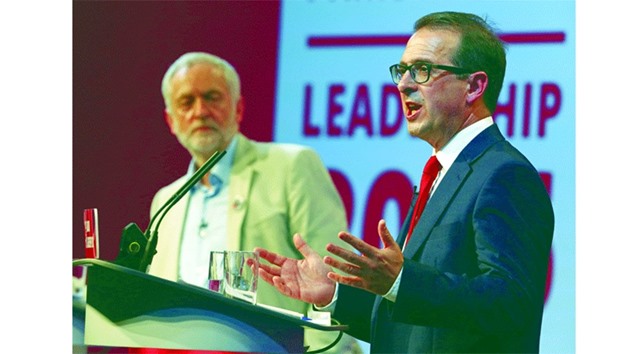Voting began yesterday to decide if veteran leftist Jeremy Corbyn will remain leader of Britain’s Labour party, with an ill-tempered campaign deepening divisions that threaten the party’s future.
Ballots and online voting forms were being sent to party members, who have until September 21 to decide whether to replace Corbyn with MP Owen Smith, previously little known outside parliament.
Corbyn, 67, is favourite and retains the backing of most trade unions and many grassroots supporters who signed up last year to propel him to a shock leadership election win.
But he has failed to win over many of the party’s MPs, 80% of whom backed a recent vote of no-confidence in Corbyn.
Britain’s vote on June 23 to leave the European Union provided the catalyst for the leadership challenge, with many lawmakers criticising Corbyn’s performance during the campaign as lacklustre.
London mayor Sadiq Khan and Labour’s leader in Scotland, Kezia Dugdale, are among those backing Smith over Corbyn.
Smith triggered the contest by declaring his candidacy last month, warning that Corbyn’s leadership was making the possibility of a split in the party “dangerously real”. The 46-year-old, a former member of Corbyn’s ministerial team, is like Corbyn targeting voters to the left of the party but says he is better placed to take Labour to success at the ballot box.
“Not some misty-eyed, romantic notion of a revolution where we are going to overthrow capitalism and return to a socialist nirvana...
but a cold-eyed, practical socialist revolution where we build a better Britain,” he promised last month.
As ballot papers went out, Corbyn released a list of four key pledges including replacing the House of Lords with an elected upper chamber of parliament and introducing mandatory collective bargaining for companies with over 250 employees.
Loud boos, cheers and heckling have characterised many of the debates between Corbyn and Smith while local party meetings have been suspended during the contest over allegations of intimidation levelled against Corbyn’s supporters.
An estimated 640,000 people will be able to vote in the contest.
Membership of Labour has surged since Corbyn became leader, with the party now Britain’s biggest by far.
However, he received a setback earlier this month when a court ruled that 130,000 new party members who joined in the six months up to July 12 could not vote.
Khan also delivered a blow on Sunday by declaring his support for Smith.
“Jeremy’s personal ratings are the worst of any opposition leader on record and the Labour party is suffering badly as a result,” Khan wrote in the Observer newspaper.
“Jeremy has already proved that he is unable to organise an effective team and has failed to win the trust and respect of the British people,” he added.
A YouGov poll conducted last week gave the ruling Conservatives 38 % support among voters compared to 30% for Labour and 13% for the anti-EU UK Independence Party.
Corbyn was seen as the best person to be prime minister by only 19% compared to 51% for the incumbent, Theresa May.
Backing Smith, Dugdale wrote in the Daily Record newspaper: “We can’t pin our hopes on a leadership who speak only to the converted, rather than speaking to the country as a whole.”
While May, who became premier in July after David Cameron quit following the Brexit vote, has ruled out an election soon, many commentators believe a snap poll could still be possible.
The Labour result is to be announced on September 24 at a special conference in Liverpool, northwest England.

Britain’s opposition Labour Party leader Jeremy Corbyn and leadership candidate Owen Smith.
